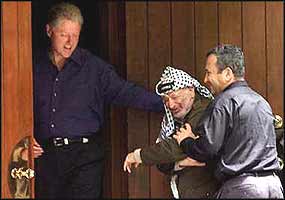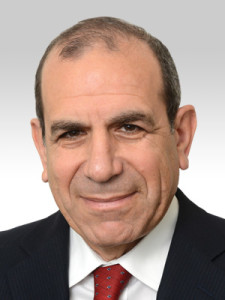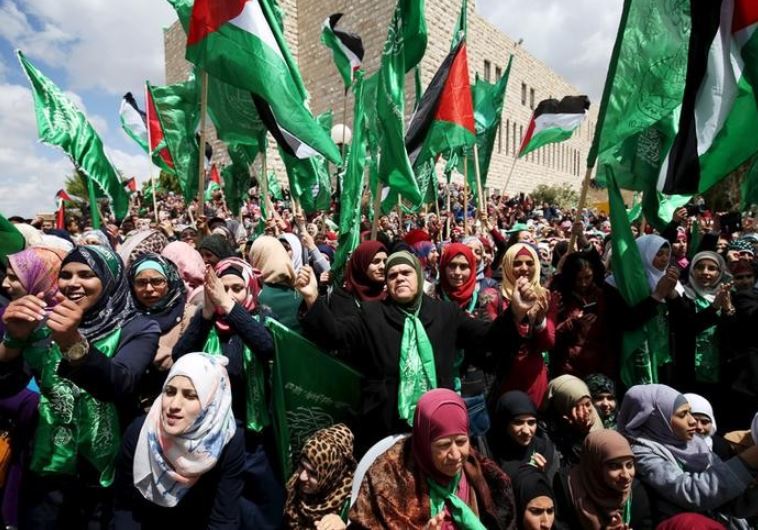In light of the decision to convene the summit in Camp David next week, I would like to share with you some of my observations and assessments following the intensive dialogue we have been conducting with senior officials from Israel and the Palestinian Authority about the future of Jerusalem. We believe that these observations and assessments are crucial in the attempt to reach an agreement about the future of Jerusalem.The Palestinians feel significantly strengthened in their positions of principle following the Israeli-Syrian negotiations and following the Israeli withdrawal to the international border with Lebanon.
The most important of these principles is sticking steadfastly to UNSC Resolution 242, which they insist applies to the West Bank and Gaza equally to its application with Israel’s other neighbors. They are convinced and have international legal opinions that support them firmly. They will stick to this position without bending even 1mm. This is a position of principle and will serve as their compass for all negotiations and agreements.
The functional translation of 242 for the Palestinians is the return to the 1967 borders. Any change of the borders will result, from their perspective, first to the agreement of Israel to the principle of 242 and the 1967 borders and then a Palestinian agreement to accept changes on territories that are first recognized as being sovereign Palestinian lands
With regard to Jerusalem it is essential to understand that for the Palestinians Jerusalem – Al Quds is the Old City. Abu Dis, Shuafat, Beit Hanina, etc. are not Jerusalem and cannot be in place of Jerusalem. The Palestinians are firmer on this issue than on any we have ever seen. The Palestinian position has significantly hardened in the past six months. The Palestinians demand and will continue to demand throughout the negotiations, a return to the 1967 borders in Jerusalem. They will hold on to the position that all of East Jerusalem must be under Palestinian sovereignty. They will argue their case through international law, UN decisions, and the general international position that Israel has no legal rights to East Jerusalem. In my view, the Palestinians will not compromise on this issue at all. At best they might agree that there be no declared sovereign over the Haram el Sharif/Temple Mount – not Israel and not the Palestinians as long as they have effective control over the Haram el Sharif/Temple Mount.If the Palestinians do gain sovereignty over East Jerusalem, they will, under pressure, agree as a sovereign, to relinquish sovereignty over the Israeli neighborhoods in East Jerusalem (within the municipal boundaries), over the Jewish Quarter of the Old City and over the Kotel. To quote one of our senior participants, the Palestinian State has no interest or desire to rule over 180,000 Israeli in Jerusalem. The relinquishment of Palestinian sovereignty over parts of Jerusalem is only “salable” to them once reminded over and over again that this is a sovereign right and not something that they are being forced or coerced to do.
There might be an Israeli decision that the price of the agreement is too high. There might be a belief on the Israeli side that the Palestinians will “cave in” under pressure, in our view, they will not and the chances for violent confrontation will increase significantly as result of increased Palestinian frustration. Arafat has received additional support from all quarters of the Palestinian society to hold firm. He will weigh heavily on the Americans to support his position of principles and he will paint Israel as the primary violator of the already signed agreements. He will raise the issue of Israeli non-compliance with the redeployments as a main example of not honoring agreements.
In our assessment, the only way to reach an agreement on Jerusalem with the Palestinians is to go far beyond what the Israeli position has ever been. Without this, there will be no final status agreement and no Palestinian agreement to end the conflict and the demands from Israel. Postponement of the decision on Jerusalem will necessarily mean that there will not be an “end to the conflict” agreement. It is essential to understand this point.
…the Israeli media reported that the Chief Rabbinate was instructed to re-examine the Halacha or Jewish religious law on the question of Jewish prayer on the Temple Mount. It was further reported that this reexamination would include the possibility of constructing an area for Jewish prayer somewhere on the Temple Mount. As the Israeli press had been publishing full of reports about Palestinian construction and excavations on the Temple Mount doing irreparable damage to Jewish historical evidence of the Holy Temple, the Palestinian and Arab media was full of stories of Israeli tunneling beneath Al Aqsa and Israeli plans to capture Al Aqsa and divide it into Jewish and Muslim prayer areas like the Cave of the Patriarchs in Hebron (The Ibrahamia Mosque).
Gershon Baskin
Gershon Baskin is one of the most recognizable names in the Middle East Peace process. He is a political and social entrepreneur who has dedicated his life to peace between Israel and its neighbors. His dedication to creating a culture of peace and environmental awareness, coupled with his impeccable integrity, has earned him the trust of the leaders of all sides of the century old conflict. Few people have such far-reaching and positive impacts on promoting peace, security, prosperity and bi-national relationships. Gershon is an advisor to Israeli, Palestinian and International Prime Ministers on the Middle East Peace Process and the founder and director of IPCRI, the Israeli-Palestinian Public Policy Institute. He was the initiator and negotiator of the secret back channel between Israel and Hamas for the release of 1,027 prisoners – mainly Palestinians and Arab-Israelis of which 280 were sentenced to life in prison, including Yahya Sinwar, the current Palestinian leader of the Hamas in the Gaza Strip. The prisoners were imprisoned for planning and perpetrating various attacks against Jewish targets that resulted in the killing of 569 Israelis in exchange for one Israeli soldier, Gilad Schalit. Gershon is actively involved in research and advocacy concerning topics such as social policy, environmental security, political strategy, peace education, economics, culture and in the development of affordable solar projects with the goal of providing clean electricity for 50 million people by 2020. He is a founding member of Kol Ezraheiha-Kol Muwanteneiha (All of the Citizens) political party in Israel. He is now directing The Holy Land Bond and is the Middle East Director for ICO – International Communities Organization - a UK based NGO working in conflict zones with failed peace processes.




